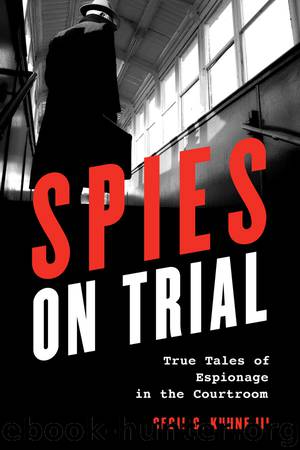Spies on Trial by Cecil C. Kuhne III

Author:Cecil C. Kuhne III
Language: eng
Format: epub
Publisher: Rowman & Littlefield Publishers
Published: 2019-07-25T16:00:00+00:00
The court explained that the original version of Section 215, which predated the Patriot Act, allowed the Director of the FBI or his designee to obtain orders from the FISC authorizing common carriers to provide to the government certain business records for the purpose of foreign intelligence and international terrorism investigations where there existed “specific and articulable facts giving reason to believe that the person to whom the records pertain was a foreign power or an agent of a foreign power.” The Patriot Act substantially revised Section 215 to provide for the production not only of “business records,” but also of “any tangible things,” and to eliminate the restrictions on the types of businesses such orders could reach.
As amended by successor bills to the Patriot Act, the current version of Section 215 allows the Director of the FBI or his designee to make an application for an order requiring the production of any tangible things (including books, records, papers, documents, and other items) for an investigation to obtain foreign intelligence information not concerning a United States person or to protect against international terrorism or clandestine intelligence activities.
In its current form, the law requires such an application to include a statement of facts showing that there are reasonable grounds to believe that the tangible things sought are relevant to an authorized investigation (other than a threat assessment) conducted to obtain foreign intelligence information not concerning a United States person or to protect against international terrorism or clandestine intelligence activities. Such an order “may only require the production of a tangible thing if such thing can be obtained with a subpoena duces tecum issued by a court of the United States in aid of a grand jury investigation or with any other order issued by a court of the United States directing the production of records or tangible things.”
Finally, the statute requires the Attorney General to “adopt specific minimization procedures governing the retention and dissemination by the FBI of any tangible things, or information therein, received by the FBI in response to an order under this subchapter.”
The order in the present case specified that the items were to be produced to the NSA and that there were reasonable grounds to believe the tangible things sought were relevant to authorized investigations to protect against international terrorism. The order required Verizon to continue production on an ongoing daily basis for the duration of the order, and it contemplated creation of a data archive that would only be accessed when NSA had identified a known telephone number for which there were facts giving rise to a reasonable, articulable suspicion that the telephone number was associated with terrorist activity or a specific terrorist organization. The order also stated that only the NSA would operate the network on which the metadata was stored and processed.
Section 215 requires the Attorney General to adopt specific minimization procedures governing the retention and dissemination by the government of information received. The procedures include (1) the requirement that the NSA store the
Download
This site does not store any files on its server. We only index and link to content provided by other sites. Please contact the content providers to delete copyright contents if any and email us, we'll remove relevant links or contents immediately.
| Espionage | Hoaxes & Deceptions |
| Murder & Mayhem | Organized Crime |
| Serial Killers | White Collar Crime |
Mindhunter: Inside the FBI's Elite Serial Crime Unit by John E. Douglas & Mark Olshaker(9324)
Wiseguy by Nicholas Pileggi(5770)
Room 212 by Kate Stewart(5105)
Hitman by Howie Carr(5089)
Secrecy World by Jake Bernstein(4741)
Killers of the Flower Moon: The Osage Murders and the Birth of the FBI by David Grann(4435)
Papillon (English) by Henri Charrière(4262)
Breaking Free by Rachel Jeffs(4216)
Killers of the Flower Moon by David Grann(4039)
Say Nothing by Patrick Radden Keefe(3975)
American Kingpin by Nick Bilton(3875)
The Secret Barrister by The Secret Barrister(3697)
Molly's Game: From Hollywood's Elite to Wall Street's Billionaire Boys Club, My High-Stakes Adventure in the World of Underground Poker by Molly Bloom(3529)
Mysteries by Colin Wilson(3447)
In Cold Blood by Truman Capote(3375)
Signature in the Cell: DNA and the Evidence for Intelligent Design by Stephen C. Meyer(3130)
I'll Be Gone in the Dark by Michelle McNamara(3082)
Rogue Trader by Leeson Nick(3039)
Bunk by Kevin Young(2993)
